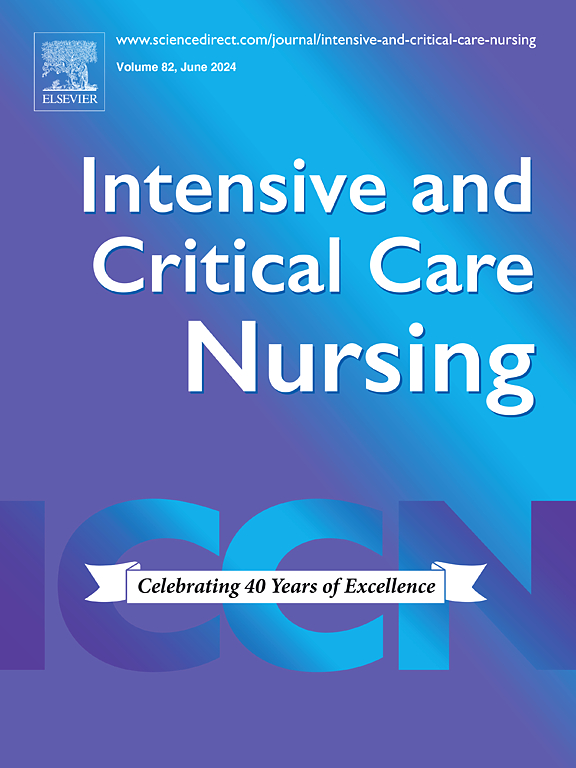危重疾病后再入院的患者及家属经验。
IF 4.9
2区 医学
Q1 NURSING
引用次数: 0
摘要
背景:危重疾病后再入院是常见的。有有限的数据,以检查病人和家庭的观点,医院再入院。从患者的角度理解再入院的影响可能有助于设计有意义的临床途径,以支持改善护理。目的:本定性分析的目的是探讨患者及其家属在危重疾病后再入院时的经历。我们还试图从患者和护理人员的角度了解这些再入院的任何感知驱动因素。方法:采用半结构化访谈法进行定性描述性研究。使用基于Miles和Huberman框架的主题内容分析方法分析数据。环境和参与者:本研究在英国市中心的一家大型教学医院进行。在危重疾病后再次入院的重症监护幸存者及其家庭成员被邀请参加再入院期间的访谈。结果:共访谈20人(患者15人,家属5人)。我们得出了与再入院相关的五个主题:获得初级保健;持续的生理障碍;排放规划和信息提供;治疗负担;照顾者的压力和社会照顾的机会。结论:从患者和家属的角度来看,有多种可感知的危重疾病后再入院的驱动因素。再入院的经历可能会给患者带来潜在的创伤。未来的研究应探讨如何改进出院计划,以及如何在出院后有效地支持家庭成员。实践意义:需要明确的出院计划和信息提供,以确保对危重疾病幸存者的有效护理。幸存者的家庭成员也可以从整个护理过程中的专门支持中受益。本文章由计算机程序翻译,如有差异,请以英文原文为准。
Patient and family member experience of hospital readmission following critical illness
Background
Hospital readmission following critical illness is common. There is limited data which examines the patient and family perspective of hospital readmission. Understanding the impact of readmissions from a patient perspective can potentially help design meaningful clinical pathways to support improvements in care.
Objectives
The aim of this qualitative analysis was to explore the experience of patient and family members during readmission to hospital following critical illness. We also sought to understand any perceived drivers of these readmissions from a patient and caregiver perspective.
Methods
Qualitative descriptive study using semi-structured interviews. Data were analysed using a thematic content analysis approach based on Miles and Huberman’s framework.
Setting and participants
This study was conducted in a large inner city teaching hospital in the UK. Critical care survivors who had been readmitted to hospital following critical illness and their family members were invited to participate in interviews during the readmission episode.
Results
Interviews were undertaken with 20 participants (15 patients and 5 family members). We derived five themes related to hospital readmission: access to primary care; ongoing physiological disturbance; discharge planning and information provision; treatment burden; and carer strain and social care access.
Conclusions
There are multiple perceived drivers of readmission to hospital following critical illness from a patient and family member perspective. The experience of readmission can be potentially traumatic for those involved. Future research should examine how discharge planning can be improved and how family members can be effectively supported in the post-hospital discharge period.
Implications for Practice
Clear discharge planning and information provision is required to ensure effective care for survivors of critical illness. Family members of survivors could also benefit from dedicated support across the continuum of care.
求助全文
通过发布文献求助,成功后即可免费获取论文全文。
去求助
来源期刊

Intensive and Critical Care Nursing
NURSING-
CiteScore
6.30
自引率
15.10%
发文量
144
审稿时长
57 days
期刊介绍:
The aims of Intensive and Critical Care Nursing are to promote excellence of care of critically ill patients by specialist nurses and their professional colleagues; to provide an international and interdisciplinary forum for the publication, dissemination and exchange of research findings, experience and ideas; to develop and enhance the knowledge, skills, attitudes and creative thinking essential to good critical care nursing practice. The journal publishes reviews, updates and feature articles in addition to original papers and significant preliminary communications. Articles may deal with any part of practice including relevant clinical, research, educational, psychological and technological aspects.
 求助内容:
求助内容: 应助结果提醒方式:
应助结果提醒方式:


